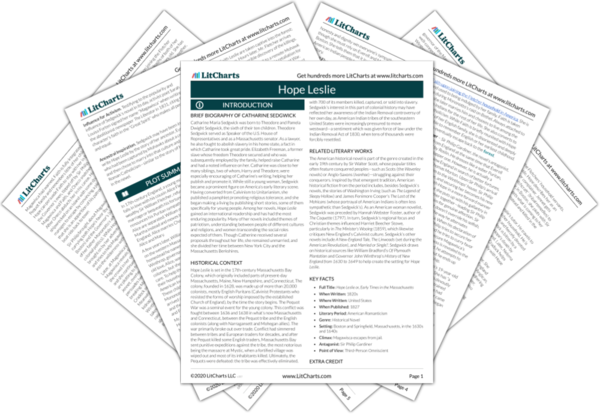In Hope Leslie, the wilderness or forest is the home of American Indian people, as opposed to the towns and settlements occupied by English colonists. As such, the forest symbolizes the absence of English civilization, the unknown, and the threat of violence at the hands of native characters against white characters. Magawisca is repeatedly referred to as a “child of the forest” whose marked intelligence is thought to contrast with her wilderness origins, and she ultimately returns to that realm, unable to assimilate into colonial society. When the Fletcher homestead is attacked by Mononotto and his warriors, they invade Bethel from the forest, and they take Everell and Faith away into that dangerous, inaccessible realm, beyond their loved ones’ best efforts to discover and rescue them. Ultimately, a character must belong either to the wilderness or to the “civilized” world, even if, like Magawisca, nature-loving Hope Leslie, or Faith (who marries a member of her captor’s family), she is able to navigate both to some degree.
Wilderness Quotes in Hope Leslie
In the quiet possession of the blessings transmitted, we are, perhaps, in danger of forgetting, or undervaluing the sufferings by which they were obtained. We forget that the noble pilgrims lived and endured for us—that when they came to the wilderness, they said truly, though it may be somewhat quaintly, that they turned their backs on Egypt—they did virtually renounce all dependence on earthly supports—they left the land of their birth—of their homes […] for what?—to open for themselves an earthly paradise?—to dress their bowers of pleasure and rejoice with their wives and children? No—they came not for themselves—they lived not to themselves.
His mother's counsels and instructions, to which he had often lent a wearied attention—the passages from the sacred book he had been compelled to commit to memory, when his truant thoughts were ranging forest and field, now returned upon him as if a celestial spirit breathed them into his soul. Stillness and peace stole over him. He was amazed at his own tranquillity. 'It may be,' he thought, 'that my mother and sisters are permitted to minister to me.'
"There lies my mother," cried Hope, without seeming to have heard Magawisca's consolations, "she lost her life in bringing her children to this wild world, to secure them in the fold of Christ. Oh God! restore my sister to the christian family."
"And here," said Magawisca, in a voice of deep pathos, "here is my mother's grave; think ye not that the Great Spirit looks down on these sacred spots, where the good and the peaceful rest, with an equal eye; think ye not their children are His children, whether they are gathered in yonder temple where your people worship, or bow to Him beneath the green boughs of the forest?"
“[M]y sweet mistress […] this having our own way, is what every body likes; it's the privilege we came to this wilderness world for; and though the gentles up in town there, with the Governor at their head, hold a pretty tight rein, yet I can tell them, that there are many who think what blunt Master Blackstone said, 'that he came not away from the Lords-bishops, to put himself under the Lord's-brethren.' […] I know which way the wind blows. Thought and will are set free. […] Times are changed—there is a new spirit in the world—chains are broken—fetters are knocked off—and the liberty set forth in the blessed word, is now felt to be every man's birth-right.












